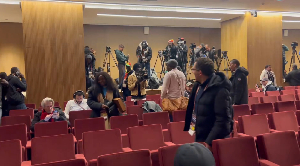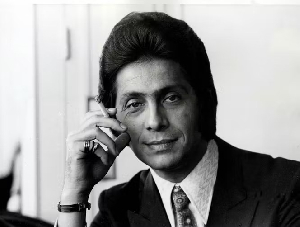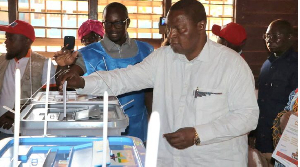Electoral Commission Warns
THE ELECTORAL Commission of Ghana has expressed grave worry over the seemingly increasing corruption in the electioneering campaigns in the country, warning that, just as a festering cancer is bound to kill its patient, vote-buying will surely kill the nation’s infant democracy sooner or later- if steps are not taken fast against it.The warning comes at a time when politics-related corruption, greed and fraud are threatening to destroy a democratic experiment similar to Ghana’s that is being carried out in the Federal Republic of Nigeria.
Ghana’s E.C.’s rare disquiet was voiced by the commission’s director of Human Resource and General Services, Samuel Yorke Aidoo, who described such bribery and corruption in the country’s pre and post electoral processes as “a cancer that, if care is not taken, could destroy the nation’s infant democracy.”
Mr. Yorke Aidoo’s parallel was gloomy: just as cancer is so dangerous a disease that it can affect the whole human body and lead to untimely but inevitable death of a patient if immediate action is not taken, so are bribery and corruption- which are gradually taking centre stage in the election of our leaders- bound to destroy our cherished democracy, if the canker is not stemmed. And the death of this political process is likely to lead the country into “a big disaster,” the E.C. warned.
In an interview with The Heritage in Accra Monday, the obviously worried Aidoo underscored that corruption is “a very serious issue” that, not only the Electoral Commission of Ghana but the entire nation should be concerned about and fight against fiercely.
As the ruling New Patriotic Party gears up for its delegates’ congress in December to elect its flagbearer for the much-hyped 2008 general election, there are reports of some aspirants distributing bicycles, motor bikes and corn mills. When the opposition National Democratic Congress went into conference late last year, there were similar reports of delegates having been influenced in cash and in kind. Indeed, the element of corruption is a bane of the whole body politic.
“In fact, the issue of bribery and corruption should not be the problem of only the E.C. but civil society, political parties as well as the entire nation,” Mr. Aidoo stressed. The Electoral Commission official was quizzed on who should be blamed for the decaying moral fabric of the average voter. To him, the blame for corruption in the country’s elections should be laid on the door steps of both the dishonest politician and his collaborator, the beneficiary who sells his conscience for money to the detriment of the silent majority.
In an apparent attempt at parrying blame, he asserted that the commission cannot monitor such illicit activities before and during elections. He argued that the commission’s sole responsibility is to establish the infrastructure, give public education on the process of voting and declare outcome of the results.
“The commission embarks on public education and sensitization programmes; especially on the electoral laws and the rights and responsibility of a voter, but vote-buying is a serious offence against the commission’s law.”
The E.C.’s plea that it cannot seriously move against corruption somewhat tends to be in tune with recent developments in Nigeria, where the Federal Supreme Court has ruled that the National Electoral Commission has no right to ban any candidate from contesting on the ground that he or she is corrupt.
Rather than hope against hope that the E.C. has the power and capacity to check bribery Mr. Yorke requested civil society organization and, in fact, the entire nation to wage a relentless fight against it. He bluntly reminded the nation that the E.C. does not belong to its few hundreds employees but, rather, to the media, politicians and the whole nation. If Ghanaians sit down for the country’s political fortunes to take a dive, “it is the people in the country who are going to suffer!”
Political parties are groups whose chief aim is to secure the mandate of the electorate to manage the affairs of state and implement laws, rules and regulations to secure life and property. As such, parties are expected to be law-abiding and to set good examples as well as assure that, if entrusted with the affairs of state, they would discharge their duties creditably and faithfully. One major law they are expected to abide with is to submit their audited financial reports yearly and on time.
Asked if all the registered political parties had submitted their financial reports for this year, the E.C. official replied that “none of the parties” had done that. He could only hope that they would comply with the rule. He mentioned that the internal measure the commission takes is to remind the parties and the political parties, in turn; put pressure on their respective candidates to comply with the commission’s rule.
Failure to submit the financial report is tantamount to a breach punishable by withdrawal of the offending party’s or candidate’s registration form. “So far, so good; we have not had any body yet,” he said in an apparent contradiction.












